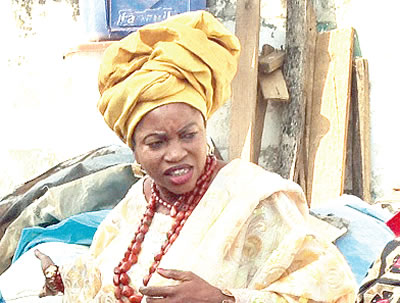Chief ’Waye Oso, the Iyaloja of Ekiti State in this interview speaks on why she is enforcing a form of price control in Ado Ekiti markets and the consequences of her action. SAM NWAOKO brings the excerpts:
MADAM, it is said that the Ewi, Oba Rufus Adeyemo Adejugbe, sent you on this errand?
It is the entire community that sent me. I was accused of not doing as much as I am supposed to do as the Iyaloja. They said in the 16 local governments, Ado Ekiti is the most expensive, and the things sold here come from these local governments. When the goods arrive in Ado Ekiti from the other local governments, they become very expensive. This is not acceptable. They come here to sell at prices way above what they even couldn’t sell in their various communities. We acknowledge the fact that prices of goods and services have gone up; and that dollar is scarce. But are we importing garri? Is it cocoyam or palm oil that we import? Some of these traders would buy 20 litres of palm oil at N3,000 in the rural areas and they come to Ado Ekiti to sell for N22,000. So any people can no longer afford to cook with palm oil.
We know that even if it is sold for N30,000, there are those who can afford it; this is just as we know that if it is sold for N10,00, there are still those who cannot buy. We have begged them to be reasonable in their pricing. But the pleas have not been heeded. They should consider the plight of the poor at the grassroots.
For instance, the woman who sells palm oil does not sell garri. She does not deal in yams. And she cannot turn her palm oil to any of these. But somehow, it has become a rule of the jungle out there in the market. Take the case of the broom we make from palm fronds: When they tie just about 10 sticks together, they sell for N50. If you cannot buy about three or four, you cannot use a broom! This too isn’t proper. We had to sell the brooms at N20. We have been pleading with the traders to take things easy. Everybody is finding the economy difficult. This level of rise in the cost of food and some other local products, in Ado Ekiti, is unreasonable and we cannot continue to watch things get out of hand.
For those that were said to have condemned what we are doing, in a newspaper editorial, I say they did so based on their level of understanding of the issues at stake. Our selling of garri at N100 is proper. Before now, it was N50 before it went to N100. Since I was born, I›ve never heard or seen garri sold as N250 or N300. It happened here. Now they resorted to N200. We’ve told traders bringing their goods to Ado Ekiti that if you cannot sell your garri at N100, don’t bring it to Ado. Find elsewhere to sell it.
The contention is that what you are doing is against free trade and law, and that there are no laws backing your action?
The Nigerian law I think is also against profiteering. When you buy at the rate of N80 and you come to sell at N200, that is wicked. In Emure-Ekiti, garri is sold at N100. Their monarch said they shouldn’t sell at more than N100 and that’s the rule there. But because the rule is effective in Emure, they now bring the garri down to Ado, where they can fleece us, the suffering poor masses. Is it that there cannot be some level of control? There should be, and there should be people who can enforce the rule. We had met with them and told them to sell at the same N100 but there hasn’t been any positive response from them. If you could make profit when you sell at N100 in Emure, then you can also make profit by selling it at N100 in Ado Ekiti. Gari should be sold in Ado at the same amount it is sold in Emure.
How would you sustain this action? The Bisi market is every five days and there are other markets in Ado Ekiti.
We want to ensure parity in the markets. When we leave Bisi market, we are moving to Okesa. We are visiting every market where goods are sold wholesale. If they had sold garri for N120, we wouldn’t have been bothered. But N200/N250 for the commodity is not acceptable. We have found that those bringing in goods contribute to the problem. For instance, we found that a trader was selling 20 litres of palm oil at N22,000 in one of the markets in Ado. Another palm oil trader heard of the price, telephoned his community and was told that it was sold at N14,000. She told them to immediately stop selling her palm oil, that the same quantity of palm oil is N22,000 in Ado. And she was making the call right there in our presence. We don’t want such. That is why we have decided to find a way around the situation. And anyone castigating the action is reprimanding the owners of the community, who have sent us on the errand.
Some people have complained that your action the previous market day has led to the hoarding of palm oil, that they haven’t been seeing the commodity to buy. Traders perhaps habour the fear of it being forcefully sold at discounted prices. Don’t you see this action of yours being counter-productive and leading to hoarding?
Interestingly, the garri we are selling today was kept in a corner of the market. The traders know what we are saying. We brought the bags out from where they were literally hidden. The palm oil sellers know that we know where they keep them and the ones already brought out today would be sold. It is going to be a continued exercise and we have our own way of knowing what is going on in the 16 local governments, which also guides our actions.
Madam, the same thing goes for local rice they call “Buhari rice”. The allegation is that sellers of the ‘Buhari rice’ have hidden their wares at a market in Sabo and refused to come to the metropolis?
We have discussed with them and they are ready to cooperate with us. If you are not in a hurry, just wait and you will see that rice would also be sold in this market today. We have held series of meetings with these traders and they are ready to go along with us.
You are the President of the Iyalojas in the 16 local governments of Ekiti State. How is the level of cooperation regarding actions such as this? What do you advise the other Iyalojas in the other localities?
All the other Iyalojas are executing the same action in their localities. We are together on this. Monarchs have themselves taken direct actions. They have personally gone into the markets. We are agreed on whatever actions we would take because we meet regularly. What we are doing in Ado Ekiti is being done in Igbara Odo, it is being done in Ikole and in many other communites. It is not just in Ado Ekiti.





